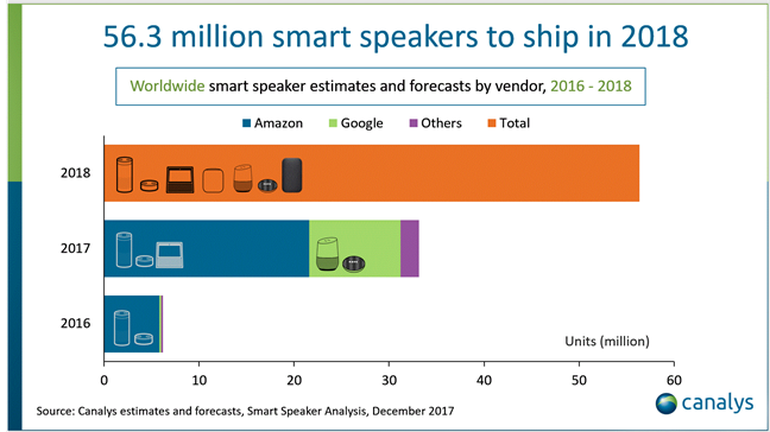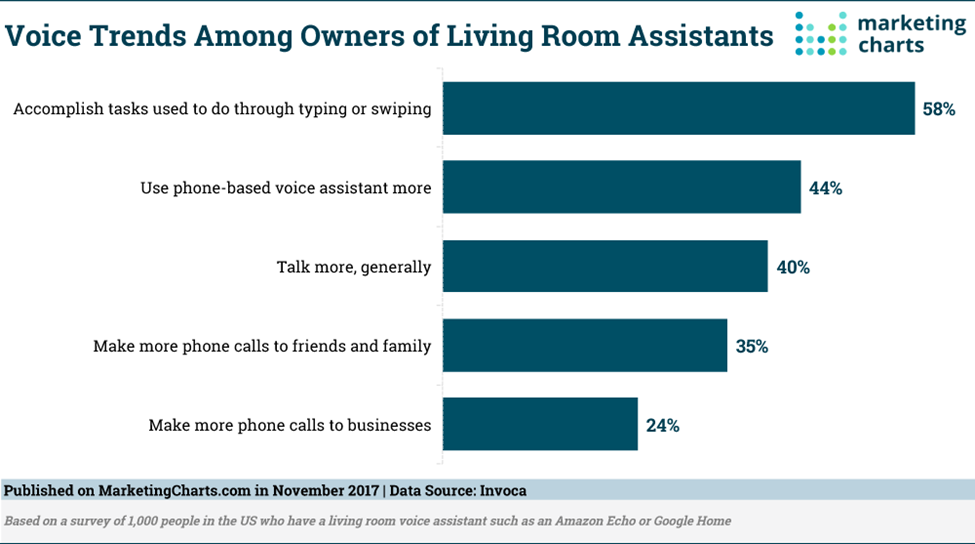
What Is Voice Search and How Can You Use It to Get More Traffic and Sales?
Voice search is a type of technology that allows mobile users to search the internet without having to type in their queries.
Have you ever queried Siri or your Google Home smart speaker with your voice to ask a question without typing or swiping? If so, then you were engaged in voice search.
What you may not have realized, though, is that behind the scenes of your query was a veritable gold mine of potential for businesses.
Voice Search: Massive Potential for Marketers
Do you feel like there is a constant barrage of new marketing tools being hurled at you? With technology moving so fast, it can be difficult to keep up.
Well, I wish we had better news for you, but technology and marketing are not slowing down anytime soon. In fact, the industry is speeding up, and if you don't want to be left behind in the wake of competitors who are actively ahead of the game, you do need to keep up with the latest tactics.
Lately, we have been dabbling in one of these trending tactics, one that is starting to gain ground and one you definitely want to watch in the coming months.
We briefly introduced this tactic to you here and here, but in today's post, we want to elaborate a little more and help you understand why it's so important for marketers, and how you can get started leveraging it to increase traffic, brand awareness and sales.
Let's dive into what it is and how you can get a piece of this pie for your own business.
The rise of smart speakers
Smart speakers (Google Home, Amazon Echo) are directly connected to voice search technology. When you speak your queries, the device answers you with the most optimized result for your question.
According to a Canalys study, as reported by ZDNet, smart speakers have become the fastest growing consumer technology, surpassing market share gains of AR, VR and even wearables.
The study also stated that smart speaker sales in the US could reach 38.4 million, and 56.3 million worldwide this year—a substantial increase from just two years ago.
Amazon and Google devices are heading up the pack with their Echo and Home devices, respectively. But even more important than Amazon and Google competing over sales is what the popularity of these devices—and voice assistance in general—can mean for marketers.
Remember when mobile search came on the scene and everyone and their mother was telling marketers to get their site mobile optimized asap? Once Google started favoring mobile sites in its index and de-ranking those that were not optimized, businesses started scrambling, and the ones who waited until the last minute were at a disadvantage because earlier adopters gained momentum.
Don't be the latecomers to the voice search party…please. Notice the trends and act on them now. Later in this article, we will discuss how to optimize for voice search. But first…
How Popular Is Voice Search?
It's uber popular.
People are putting down their phones and speaking up.
According to an Invoca survey of 1,000 people in the US who own a smart speaker, 89% talk to their devices every day, and one-third do so more than five times a day.
Fifty-eight percent accomplish tasks via voice now instead of typing or swiping. Even on their smartphones, people are taking advantage of voice assistance more, with 44% using their phone-based voice assistant.
The aforementioned Invoca survey also cites that voice is now responsible for one in five Google searches. In 2020, half of Google searches could include voice queries.

Yeah, that’s oozing with popularity…
What are your customers doing with voice search?
People use voice search for everything — making travel plans, checking banking balances, getting diet tips, searching for top news stories and more.
Here's the kicker: People use voice assistants not only to search but also to purchase. Are you starting to see the potential here?
Thirty-six percent have used voice search to purchase stocks; 37% have used voice assistance during the process of booking travel and 39% mention that interacting with a voice assistant influenced a purchase in the last month. And, nearly 75% report making a purchase directly through their voice assistant.
How Can Voice Search Benefit You?
What benefits can you expect from implementing voice search? Here are just a few:
More foot traffic
If you have a local establishment, optimizing for local voice search will attract more people to your place of business. When users speak a question that pertains to a local vicinity, your website link can appear. For example, a query such as, “Where's the nearest Italian restaurant?” will send users to your website link, but only if you are well-optimized for local search.
More internet traffic
Optimizing for voice search can funnel many more people to your website. When people ask voice-related queries, if your related content is optimized (more on this later), it has the potential of showing up in voice search results and hitting the all-coveted position zero (more on this later too).
Leadership and authority
If search results feature your brand as a resource for answers, people will perceive you as an authority on the topic. Imagine a scenario where a prospect is asking a question and your business offers them the exact answers they need. Your brand just became an instant authority and your products also just became a lot more desirable.
Increased sales and revenue
Increased brand awareness and traffic equates to increased sales and revenue. And the traffic will be highly qualified because you will be targeting specific queries that people who are ready to purchase will ask. That puts your website in exactly the right place at the right time (in front of hungry buyers who are looking to buy a product like yours).
How to Optimize for Voice Search (Right Now)
Ready to start optimizing? Here are some plans you can work on right now.
Start Listening and Creating Content
You can't optimize for voice search effectively if you don't know what to optimize for. To do this, start listening to what questions your audience is asking. Then, update your content with these questions and also create new content around these queries.
We talked about listening in our data-driven article series and detailed how important this is with regard to improving your customers' experience and staying competitive in today's marketing climate.
Here are some ways to start listening:
- Monitor your customer service questions for top queries
- Review what your audience is discussing on social media sites
- Check Q & A sites like Yahoo Answers and Quora for top queries around your search terms
- Poll your sales team for top questions asked by prospects
- Ask your audience outright! Send a survey to ask what their top concerns or questions are
Find out which questions are most important to your audience and then create content around these queries.
When crafting content for voice search, think about keywords related to how people speak, not what they type into Google. For example, a typical search query may look like this:
Best vegan food Los Angeles
Optimizing for this phrase won't help you get found in a voice search query, however. With voice technology, people ask complete questions so the assistant can fully comprehend what they want. They use how, what, where, when and why. So, the above search query will be asked like this in a voice search:
What is the best vegan food place in Los Angeles?
When brainstorming topics for new content, consider adding a few of these query-focused pieces to your website. You can even create Q & A pages based on your customers' top questions.
If you need more help figuring out which queries to target, you should consider using a tool such as answerthepublic.com. Type in your main keyword and the tool will spit out questions searchers ask.
One thing: When you visit the website, you may want to pause the video of the freaky guy staring at you making weird gestures…

This may haunt my dreams tonight.
Let's say you offer online cooking classes and you want to create some content to optimize for voice search. Querying “cooking classes,” you get these questions:
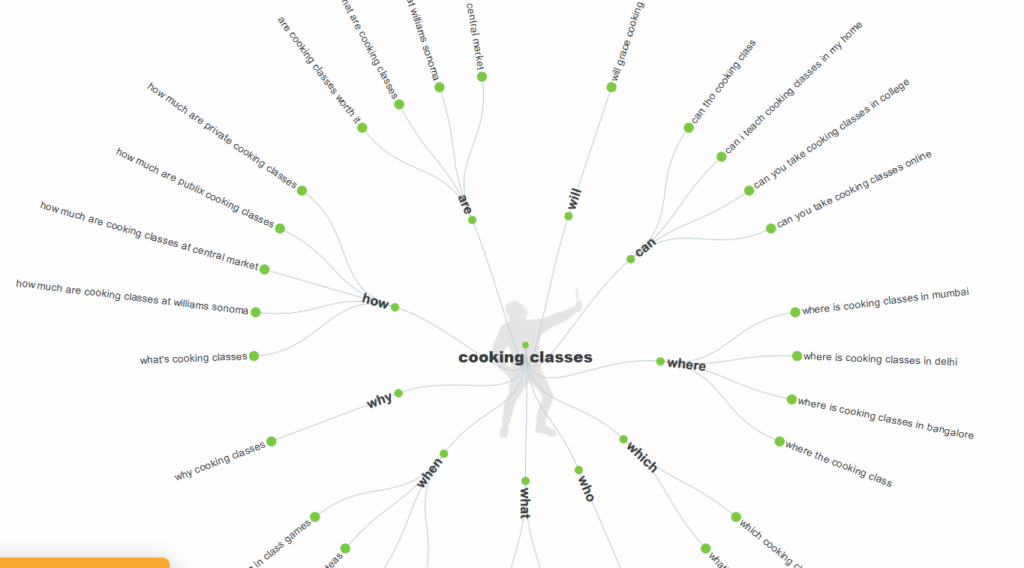
The key to choosing questions to optimize is to start with the queries that are most important to you, the ones that would bring you the most traffic from people who will be willing to buy. What you are looking for are keyword queries with intent to purchase behind them.
So, two questions popped out at me from the above image:
“Can you take cooking classes online?”
“Are cooking classes worth it?”
The people asking these questions may be close to purchasing because they are considering the possibility of taking classes. You can also create a piece of content around them.
For the second question (“Are cooking classes worth it?”), maybe you could create a 10-step list on the benefits of cooking classes and then optimize that page for voice search. On your page, you could advertise a free lead offer or free trial to your program. Below, we talk more about how to optimize a piece of content like this to get it ranked highly for your queries.
Dominate Position Zero
We reported on position zero in a recent article where we compiled some of the instruction presented at the 2018 Traffic & Conversion Summit. We will go over some of those again here and provide a little more detail.
Position zero is an organic search result (not an ad) that sits at the top of the search results page and features snippets from the article. Here is position zero for my query, “how do you choose a college.”
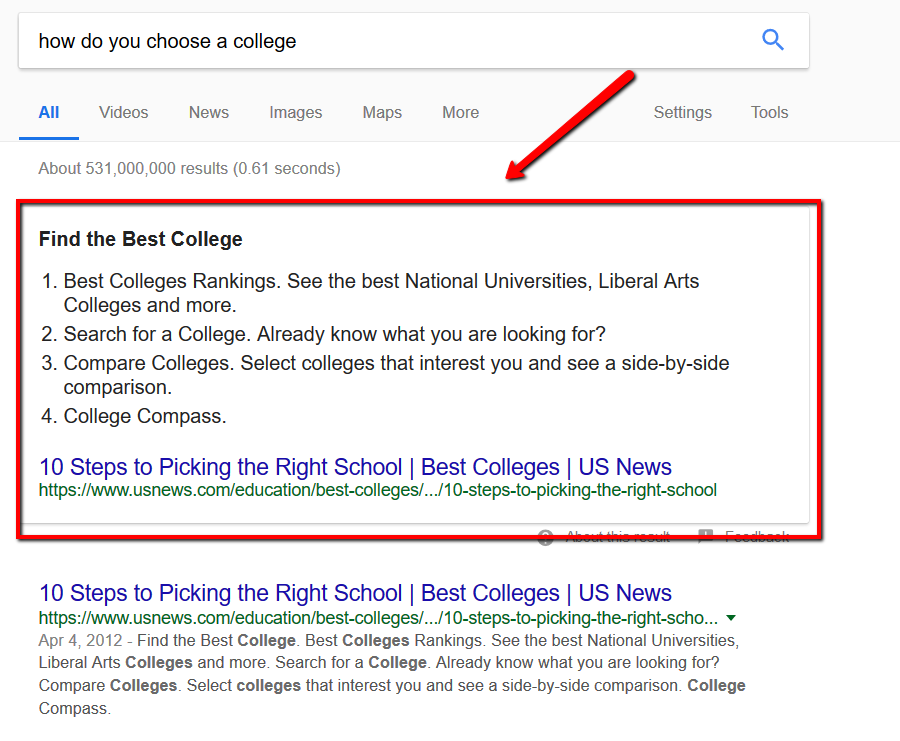
The search results feature snippets from the actual content. The numbered list is taken directly from the H2 header tags.
How do you dominate position zero?
Be better than the current position zero for the search query you are going after and optimizing. To do this, you need to do some undercover stealth work though.
If you are trying to outrank this post and claim the top spot, your content must be better than what is currently there. Going back to our college example, I clicked on the position zero search result, to see what type of content it was.

Not a heck of a lot of content for such a prominent ranking, and it could be outdated. I would argue that someone could do a lot better with a more comprehensive piece covering more points. Imagine how many more “mediocre” position zero results there are like this? I think it's time for you to dominate a few.
Analyze the position zero content for your query and study it until you can come up with a plan to create a better version. Also, add your keywords and the exact query to the following (this is important!):
- URL
- Title
- Description
- First paragraph
Make each answer headline in your content an H2 heading tag since Google forms the step-by-step answer lists in the search results from those headers.
Use Rich Snippets
Google introduced rich snippets so webmasters could feature snippets of their website content on the search results pages to entice people to click. Back in 2016, Google updated rich snippets to include rich results or cards, a schema.org structured markup that displays more visual content in the search results pages:
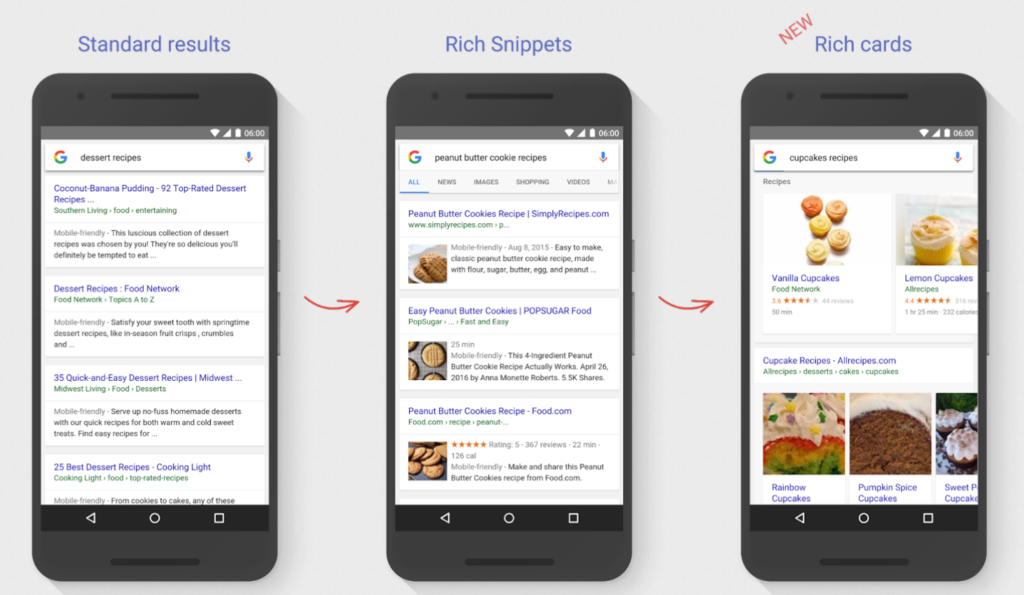
These visuals provide users with a better experience allowing them to browse through content directly on the search results pages.
This topic is a bit technical and may be one for your developers to implement. Here is some documentation that explains it in more detail.
Know Your Stuff
If you want to start optimizing your content but you are still unsure of where to start, it may be best to hire qualified professionals. With the trend moving as quickly as it is, you don't want to waste time learning and testing with trial and error experiments.
What Do I Do Now? Next Steps…
We talked about a lot in this article, so here is a quick recap on how to get started with voice search.
- Start listening; get insights from customer service, sales teams, social media and discover what it is your customers want answers to
- Find queries you can write content on and that cater to purchase intent
- Optimize your content to dominate position zero
- Optimize for local search (if you have a physical location)
- Use rich snippets
- Get expert help, if needed (we are always here to assist)
Are you ready to try voice search optimization for yourself? If you are new to the game, reach out to a professional or start with one query just to get an idea of what it is about. If you run a local business, get optimized for local search (you should be doing this anyway) and then start researching some local queries to optimize.
Voice search is just beginning to explode and we are getting everything out of it we can. We would love for you to take this exciting journey with us. Good luck!

